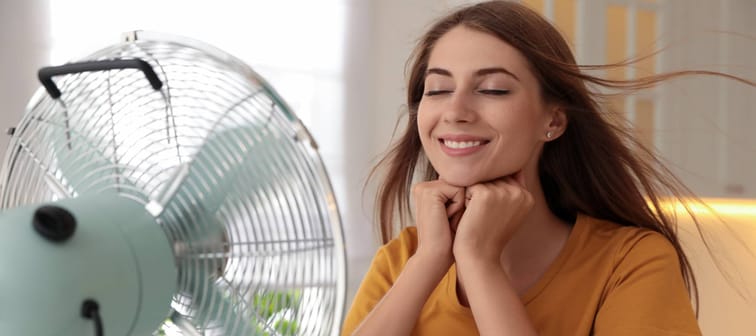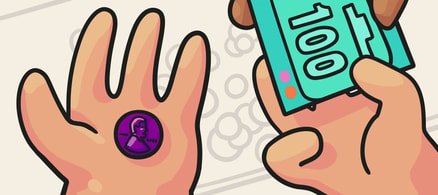1. Plugging appliances in near the thermostat

Nearly all appliances emit a certain amount of heat, according to Best Life.
If your favorite toaster is placed too close, the thermostat may register the rise in temperature and make your electricity bills rise accordingly.
Keeping your appliances in good health is also necessary.
Safe Electricity, a public awareness platform of the Energy Education Council, advises to look out for frayed cords, and steer clear of second-hand items you find at garage sales.
Malfunctioning appliances can not only hike up your electricity bills, but they can also be fire or electrical shock hazards.
Meet Your Retirement Goals Effortlessly
The road to retirement may seem long, but with WiserAdvisor, you can find a trusted partner to guide you every step of the way
WiserAdvisor matches you with vetted financial advisors that offer personalized advice to help you to make the right choices, invest wisely, and secure the retirement you've always dreamed of. Start planning early, and get your retirement mapped out today.
Get Started2. Not insulating your attic

Attics can’t just be for storing your old yearbooks.
According to the government-approved efficiency site Energy Star, those drafts that you feel in winter usually come from either an uninsulated basement or an uninsulated attic.
If you are lucky enough to live in a state that doesn’t have cold winters, Energy Star states that an uninsulated attic can also cause the cold air from your air conditioner to escape into the great outdoors.
If neglected and left — literally — to the elements, your attic can sustain weather damage like burst pipes, which will mean a hefty repair bill.
As long as you are careful not to cover your attic’s soffit vents with roll-out insulation, Energy Star says, it can be a DIY project.
3. Not sweeping often enough

Sweeping is one of those meditative, yet thankless chores.
The dust seems never-ending, but afterwards, seeing what you piled in the dustpan can make you feel accomplished.
Since not sweeping isn’t an option, it’s worthwhile to remember it can also be destructive.
Verified home improvement website The Spruce reports that as you sweep, often the dirt, sand, and bits of food that you collect will be gritty.
Options, according to Wood Floors Cleaner, might be to invest in a dusting mop, which “dusts” your floors with a microfiber mophead.
If you must use a broom, choose one with closely-bound, soft, synthetic bristles.
Kiss Your Credit Card Debt Goodbye
Having a single loan to pay off makes it easier to manage your payments, and you can often get a better interest rate than what you might be paying on credit cards and car loans.
Fiona is an online marketplace offering personalized loan options based on your unique financial situation.
When you consolidate your debt with a personal loan, you can roll your payments into one monthly installment. Find a lower interest rate and pay down your debt faster today.
Get Started4. Hanging that Van Gogh print

You have your own place now, and you want to trade your posters for framed art.
That’s totally understandable, but it is highly advisable you locate the studs in the wall before you begin.
As Bungalow shares, studs are the wooden beams behind your drywall, usually 16 or 24 inches apart.
If you hammer a nail into a part of the wall where there is no stud, chances are you will either tear a chunk out of it while you’re working — or your picture will, when it falls.
According to Good Housekeeping, you can find studs in your wall by looking for the nearest power outlet, by tapping and listening for a more muffled sound, or by downloading an app on your smartphone.
5. Letting those vines grow

There is something incredibly picturesque about vines growing up a brick wall — it’s your house’s potential 24/7 selfie backdrop.
But beauty can mask a destructive force.
According to Architectural Digest, certain types of vines like clinging perennials with aerial tendrils — think Boston ivy — can clamp onto brick or shingles and pry them apart.
This can lead to weather damage, mold, and it is an open invitation to bugs to come party at your place.
In some cases, the weight of vines can collapse roofs.
While this is more of an issue for wooden houses in more temperate climates, you may want to keep an eye on them regardless.
If you don’t want to live without your vines, they will require regular trimming and maintenance or better yet, remove them from your walls and train them up a trellis instead.
6. Letting critters move in

If you notice evidence of pests or rodents in your home, you’ll want to take care of the infestation right away with traps or by calling a professional.
The Environmental Protection Agency (EPA) highlights two types of animals you should watch for: termites and mice.
According to the University of Maryland, termites eat wood and a single colony can use food sources that are over 200 feet apart.
The EPA warns that you may not know you have termites until it’s too late, so it is recommended you do regular checks, sealing up cracks as needed.
Another pest, the mouse, while cute, can carry infectious diseases that are harmful to humans, and can chew through your food as well as your electrical wires.
7. Letting your faucet drip

Yes, the sound of running water can be relaxing, but it can be accompanied by the sound of money leaving your wallet.
Be careful if one of your taps runs, and when you turn off the water valve to check it out, it continues to drip.
Leaks, if left to their own devices, can cause extensive — and expensive — water damage. Forbes Advisor says that repairing this type of plumbing issue can cost, on average, $400.
Home improvement expert Bob Vila states that water issues can also cause mold, and all sorts of other structural damage.
8. Neglecting your roof

According to home improvement guru Bob Vila, there are several warning signs that your roof isn’t doing so well.
If you see the shingles beginning to curl up, that could mean they are letting water and other debris through.
Dark stains on the shingles could be mold, which can lead to costly damage.
But Bob has a few hacks to keep your roof healthy.
Get on a ladder in spring and in fall to look at your roof close up.
Also, sweep it consistently for debris and clean your gutters when necessary.
If your roof does need some TLC, get an estimate ASAP.
According to Forbes Advisor, while minor repairs usually cost under $1,000, major ones can cost up to $7,000, and a replacement is often over $8,000.
9. Ignoring your itchy eyes

Mold is detrimental both to your house and to your health.
If your skin is itchy and your nose is runny, it could be an indication of mold in your home.
The Carolina Asthma and Allergy Center shares that often, allergies can appear suddenly due to new factors in the environment.
According to the EPA, mold produces allergens, irritants and a variety of symptoms in sensitive people including skin rash, and various hay-fever-like reactions.
Mold grows where water accumulates, and so it is important to do things like make sure you properly ventilate your bathroom, and fix any leaks in your home.
According to the EPA, once mold begins to grow, it can be hard to eliminate, and it causes air quality issues in your home.
10. Thinking those flickering lights are romantic

For sure, storms can make your lights flicker.
But, if you’re noticing that your lights are flickering randomly or without an external reason, construction and repair encyclopedia Inspectopedia reports that could mean a faulty circuit board or failing appliances.
There are a few things you can check yourself if this is happening to you.
First, according to CNET, you can tighten the lightbulbs in your fixtures, or check the circuit breakers by powering each load individually and listening for a distinct buzzing noise.
If these tips don’t solve the flickering issue, consider calling in a professional, because faulty wiring could mean increased risk of electrical fires.
11. Bad water pressure in your showers

According to the home repair website The Spruce, a dripping showerhead could be a sign that there’s a problem with your plumbing.
They offer a few tips on how to diagnose what’s going on, like taking the showerhead off to test the pipes.
If the showerhead isn’t the culprit, it could mean that your pipes are behind the lack of pressure.
According to realtor and home assessment experts House Logic, knowing the age of your pipes is important, because they could be made of materials that are no longer deemed safe.
And while that doesn’t mean that you need to replace them, age becomes more of a factor if they weren’t maintained properly.
Pipe repair can take a lot of time, be expensive, and often it can be averted if pipes are checked regularly.
12. Not cleaning your HVAC filters

Centralized air, or an HVAC system — short for heating, ventilation and air conditioning — may seem like heaven when you’re withering in a heat wave.
But have you taken care of it by doing regular maintenance, like cleaning out the filters or its evaporation coil, as Ohio heating and cooling company Logan Services suggests?
Not cleaning the system could lead to it clogging or breaking down completely.
According to an article about home improvements published by Bob Vila, if your HVAC needs repair, it can necessitate a lot of unforeseen costs, like replacing the air ducts, adding extra insulation if required, and of course, the cost of labor.
You should budget about $25 to $60 per square foot of your home.
You can always just fill a bathtub with ice cubes and turn a fan on.
13. Paving right up to your foundation

When you’re driving home from work, of course you’d want to be able to open your car door and fall through your front door.
But as The Washington Post states, asphalt and concrete do not absorb water, and because of that, it may not be best to pave your driveway right up to the foundation.
When it rains, there will be nowhere for the collected water to evaporate to, and it will collect against the foundation of your house.
If water pools around your foundation long enough, the Ohio Basement Authority says it could rot the wood, or cause other structural damage. This could mean flooding and other things you don’t want to deal with.
14. Neglecting to dry up puddles

If you leave a damp bath mat or some damp clothes on the floor after your shower, or leave some towels on the floor for laundry, that can lead to moisture seeping into the floor.
Do that enough times, and you can warp or stain your flooring.
If some of the moisture gets trapped under your floor, it won’t be able to easily evaporate and can lead to mildew and mold, says the EPA.
The EPA also advises that, beyond the cosmetic aspect, mold can cause structural damage and be bad for your health.
15. Wearing your outdoor shoes inside

If you wear your outdoor shoes inside, do you know that in addition to the dirt and dust you’re tracking in from outside, you are also potentially bringing in microscopic bits of fecal bacteria?
That’s right. Poo.
A study initially conducted by the University of Arizona in 2008, but reported on in depth by USA Today in 2019, had researchers perform experiments to see what truly happens when we wear our shoes inside.
For the study, 10 people wore a new pair of shoes for two weeks before they were sampled.
When tested, the outside of their shoes averaged 421,000 units of bacteria — and fecal matter appeared on 96% of the shoes that were surveyed.
Apparently the transfer rate from outdoor shoes to clean, indoor tiles was between 90-99%.
16. Pouring grease down your drain

You don’t have to give up bacon, but you might want to stop putting it down your drain.
As Thought Co. reminds us, once cooking grease cools, it can turn solid.
Reader’s Digest says that if grease is poured down your drain, it can turn into sticky clumps that adhere to the side of your pipes, and will eventually form a clog.
It can even do damage to your whole neighborhood’s system.
A possible solution for the problem would be to put a lidded container by your stove.
Once it’s filled, you can dispose of the container.
17. Using dryer sheets in your dryer

Dryer sheets can make your laundry smell fantastic, and it helps to eliminate static from your clean laundry.
But it is slowly destroying both your appliances and the clothes it is supposed to protect, says CNET.
First of all, a common ingredient in most dryer sheets — and fabric softeners — is stearic acid.
If you put dryer sheets in with your clothes as you’re drying them, the stearic acid will melt out of the sheets, coating your clothes, which is what eliminates the static.
But the acidic, waxy residue builds up on the lint filter in your dryer, which then leaves lint on your clothes.
It can negatively affect the lifespan of your favorite T-shirt and your dryer.
A good substitution, according to Reader’s Digest is wool or rubber dryer balls.
18. Using chemicals on that clogged drain

Clogged drains are gross.
It’s understandable that you want to clear them post-haste.
At the same time, according to home design site Hunker, you may want to avoid using heavy-duty, chemical cleaners to get your sink or toilet working again.
While drain cleaners are a great short-term solution, in the long term not only do they strip the gunk from your pipes, they strip your pipes as well.
A much safer solution is a bit of dishwashing liquid and hot water put down your drain to dissolve the clog.
You can avoid getting clogged drains by doing a little regular maintenance.
According to Today, pouring hot water, or vinegar down your drain every week or so can help with removing buildup in your pipes.
19. Neglecting your garage

Your garage can still be your hang-out cave — you just can’t forget to inspect it.
The U.S. Consumer Product Safety Commission issued a press release to warn against the dangers of garage doors that aren’t looked at regularly.
While certain safety features have been required of all automatic garage doors since the early 1990s, the commission recommends a few of the following tips for regular maintenance.
First, keep your garage in tip-top shape by testing the door’s reversing function.
Place an object underneath the door, and if the door hits it and doesn’t immediately reverse, it should be repaired or updated.
Regularly check the springs on the door, and place both its control panel and remote control out of the reach of curious children.
One last thing — if something is out of whack with your garage, do not hesitate to call a professional.
20. Slamming your doors

While slamming the door might be satisfying, it’s doing some hardcore damage to the frame and can eventually push the jamb away from the trim, says HGTV.
If it’s an external door that you’re slamming, the little openings you’re creating around the door can let in moisture and let out heat.
Moisture, if left unattended, can cause mildew and mold in your home, and the drafts will increase your heating bills.
Also, according to How Stuff Works, unsealed doors can invite in all kinds of creepy-crawlies who will take your open-door policy quite literally.
21. Flushing your antibacterial wipes

Disinfecting the surfaces in your home may have become more important in the past few years, but if you’re flushing them down the toilet, you should stop.
In their article about more wipes being flushed recently due to the pandemic, The Washington Post shares that the non-woven fabric in the wipes can soak up debris and congealed grease, which can lead to impressive clogs in your pipes.
An expensive repair can be avoided if you just toss those wipes in the trash, instead.
22. Letting clutter accumulate

Tl;dr: Bugs — clutter leads to bugs.
While a little is understandable — you have to live, after all — too much, or clutter left too long, can potentially lead to some infestation issues, says home improvement site The Spruce.
Food, damp clothes, or old paper can be a friendly invitation for different rodents, spiders, pantry and other moths and cockroaches.
The Spruce’s suggested solutions seem easy to execute.
First, take any trash with food in it outside every day.
Consider going through your home once a season to sweep it for paper, and specifically cardboard, to make sure nothing has nested there.
Finally, watch your cords and dry goods for signs of nibbling.
23. Making your bed right when you get up

While nobody can dispute that a made bed can start your day off on the right foot, you may want to wait a bit before doing so.
Home improvement site The Spruce says that the issue here is the dust mites that both need your flakes of dead skin to snack on and the moist environment of sweaty sheets to thrive in.
The American Lung Association says dust mites pose no real danger, but they leave behind “fecal pellets” and body fragments.
There is a quick and easy fix for this — allowing your sheets to air out for a few minutes after first getting up, then making your bed once they’ve had a chance to … well, breathe.
24. Cleaning with vinegar

White vinegar is an effective, natural cleaning agent that will also make your house smell like a French fry truck, if you like that sort of thing.
In all seriousness, while vinegar is a great cleaner for certain things, on others it can wreak impressive damage.
Consumer Reports says that you should never ever use vinegar to clean your countertops.
Depending on what your counters are made of, the vinegar can dull their natural shine.
Also, it is recommended you not use it on your floors because it similarly will cloud and stain different types of flooring.
Some flooring manufacturers will even void their warranty if they find evidence of vinegar being used as a cleaning agent.
Sponsored
Follow These Steps if you Want to Retire Early
Secure your financial future with a tailored plan to maximize investments, navigate taxes, and retire comfortably.
Zoe Financial is an online platform that can match you with a network of vetted fiduciary advisors who are evaluated based on their credentials, education, experience, and pricing. The best part? - there is no fee to find an advisor.







